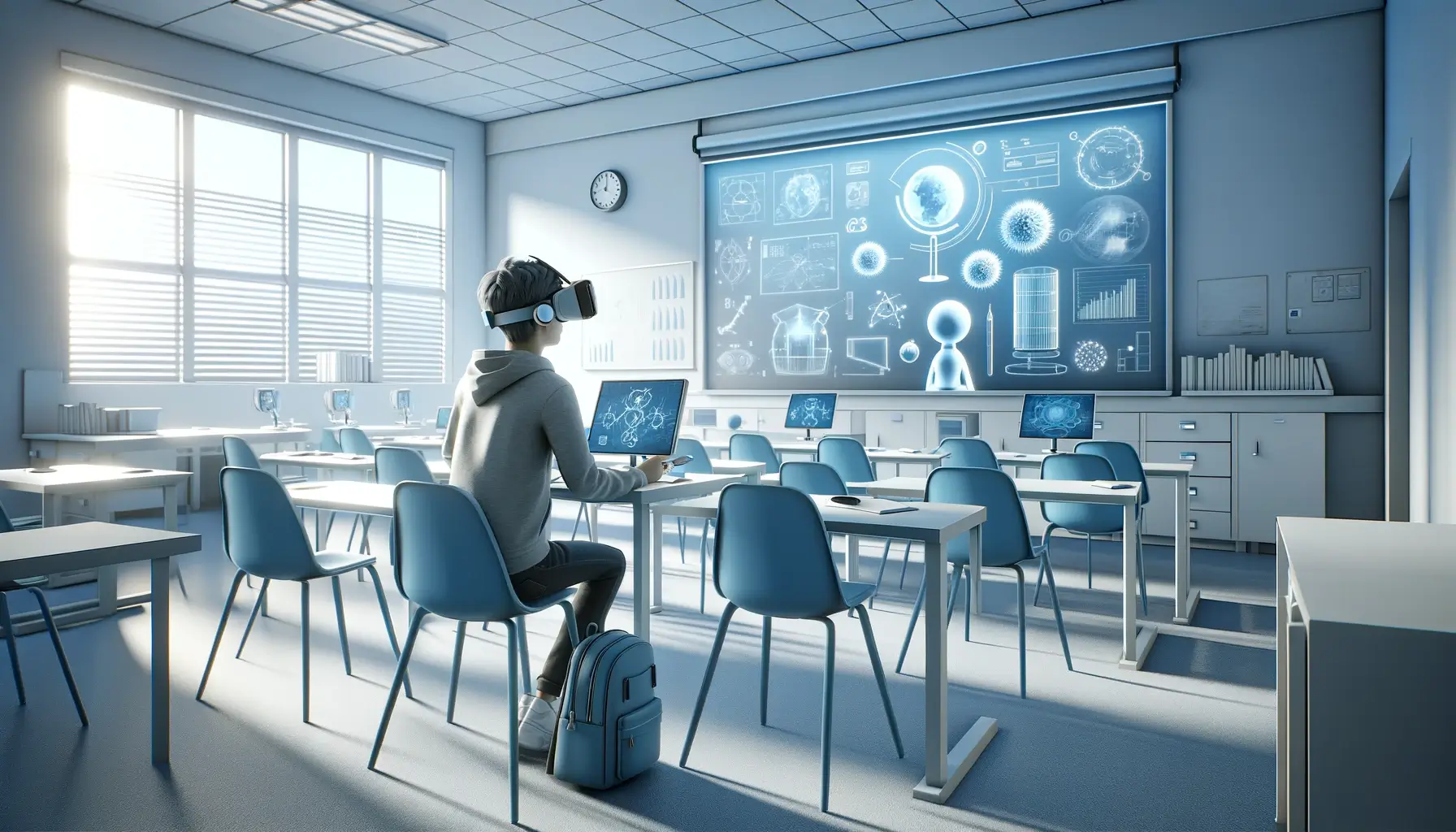As we approach a technological revolution, online education is experiencing significant changes. New tools and platforms are reshaping how knowledge is shared and learned.
This article examines the substantial changes brought by advanced technologies to online education, discussing how they improve learning while also posing new challenges and opportunities for educators and students.
Digital Classrooms
With advancements in technology, the traditional classroom has transformed significantly. Instead of relying on chalkboards and fixed seating, modern learners can access top-quality education with just an internet connection.
Innovative platforms like virtual classrooms offer personalized instruction, catering to each student’s unique learning style and pace. These virtual environments support interactive discussions, collaborative projects, and immediate feedback, mirroring the dynamics of in-person classes.
Additionally, multimedia elements like videos, simulations, and interactive quizzes enrich the learning experience, boosting engagement and understanding.
Interactive Learning through Gamification

Gamification has transformed education by turning routine learning tasks into engaging, interactive experiences. By integrating playful elements into educational software and apps, students are encouraged to actively engage with different subjects.
Gamified learning environments provide instant feedback, rewards, and achievements, fostering a sense of advancement and success. This method is highly effective in captivating learners across all age groups, from K-12 to higher education, as it makes learning enjoyable and immersive.
The Rise of Online Courses
The availability of online courses has surged with the emergence of numerous online platforms. These courses cover a wide range of subjects, from fundamental academic topics like math, science, and literature to specialized fields such as coding, digital marketing, and environmental science.
Learners can explore diverse interests and career paths, including global politics, economics, and cultural studies, by becoming a master in international relations online from anywhere in the world. Additionally, online education goes beyond traditional subjects, introducing new disciplines like drone piloting, ethical hacking, and AI program development, which are highly relevant in today’s technology-driven job market.
This abundance of online courses ensures that individuals seeking to expand their knowledge and skills have access to a broad array of learning opportunities, fostering lifelong learning in a flexible and dynamic manner.
The Influence of Big Data on Personalized Education
Big data analytics has introduced opportunities for personalized learning experiences in education. By analyzing extensive data collected from students’ learning behaviors, educators acquire valuable insights into their individual strengths, weaknesses, and preferences.
This data-driven approach empowers teachers to customize educational content, teaching methods, and evaluations to address the specific requirements of each student. Personalized education ensures that learners receive focused assistance and direction, leading to enhanced learning outcomes and a more effective educational process overall.
Artificial Intelligence as a Personal Tutor
The integration of AI in education has elevated personalized learning experiences. AI-powered systems serve as virtual tutors, delivering tailored support and guidance to students. Using Natural Language Processing (NLP) and machine learning algorithms, these AI tutors comprehend students’ inquiries, provide immediate feedback, and adjust their teaching methods based on individual progress and performance.
Additionally, AI tutors offer personalized recommendations for supplementary resources, exercises, and practice materials, ensuring a customized learning journey for each student. With AI acting as a personal tutor, students gain access to extensive knowledge and receive personalized assistance, empowering them to thrive in their educational pursuits.
Virtual Reality: Immersive Learning Experiences

VR technology has transformed student engagement in education by offering immersive learning environments. Through VR, learners can explore and interact with virtual environments that were previously inaccessible.
For instance, students can navigate ancient civilizations, conduct intricate laboratory experiments, or dive into ocean depths, all within classroom settings. This hands-on learning method encourages deeper understanding, critical thinking, and problem-solving skills.
By integrating theory with practical experiences, VR enriches the educational journey and equips students to tackle real-world challenges. With VR, students embark on captivating educational adventures that spark curiosity and broaden horizons.
See also: Top Virtual Lab Software for Enhancing STEM Education
Addressing Digital Equity Challenges
As technology becomes integral to education, ensuring digital equity for all students is paramount. Efforts are underway to provide equal access to technology and connectivity for every learner, regardless of socioeconomic status or location.
Initiatives include offering affordable internet access, lending devices to students in need, and implementing digital literacy programs. Prioritizing digital equity aims to bridge the gap and create equitable opportunities for all students to thrive in the digital space.
Preparing Students for an Automated Future
As automation and AI reshape the job market, education systems must evolve to equip students with essential skills for the future. Beyond subject-specific knowledge, there’s a growing emphasis on fostering critical thinking, problem-solving, creativity, and adaptability.
Integrating technology training into the curriculum ensures students develop the digital fluency essential for modern workplaces. Moreover, promoting an entrepreneurial mindset and lifelong learning prepares students for continuous upskilling and reskilling in a rapidly changing world.
By instilling the right skills and mindset, we empower students to navigate the automated future confidently and seize emerging opportunities.
Ethical Considerations in Tech-Driven Education
As education increasingly incorporates technology, it brings forward significant ethical challenges. Issues like privacy, the rights over intellectual work, and the safety of online data are now more relevant than ever. Online learning platforms, for instance, gather a lot of personal information. This raises questions about how to protect student privacy and prevent the wrong use of this data.
The rights to intellectual property are also a key concern. In the online world, educational materials can be copied and shared easily, often without giving credit to the original creator or getting their permission. Both teachers and students have to be mindful about how they use and share content, making sure they do it in a fair and respectful way.
Another important issue is cybersecurity. Schools and other educational institutions depend a lot on technology, which can make them targets for data breaches or cyberattacks. To keep everyone in the educational community safe, it’s important to have strong guidelines about ethics and security measures in place.
As technology becomes a bigger part of learning, we need to tackle these ethical problems head-on. It’s essential to make sure that the educational environment remains a secure and ethical place for everyone involved.
In conclusion, the digital transformation of education presents both vast opportunities and significant challenges. Online education has the potential to democratize knowledge, offering personalized and immersive learning experiences.
However, bridging the digital divide to ensure equitable access for all learners remains crucial. Collaborative efforts among educators, students, and policymakers are vital to refining emerging learning modalities responsibly.
Through innovative and inclusive approaches, we can shape a future where education fosters boundless opportunities, inclusivity, and the development of the next generation of thinkers, innovators, and leaders.
Related Articles:
- 5 EdTech Platforms Redefining Online Education
- 5 Cutting-Edge Technologies Transforming College Campuses
- How Important Is the Role of Technology in Remote Learning?
- Implementing Gamification in Educational Software for Enhanced Learning
- Online Learning for Students: 6 Must-Have Items and Considerations
- How Does Technology Help Students Learn Better?
- What Impact Does Technology Have On Student Learning?
- Gamification in Education: Engage and Motivate Students
- Customizing Learning Experiences With The Best LMS
